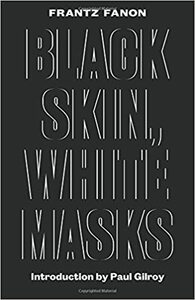Take a photo of a barcode or cover
challenging
informative
reflective
medium-paced
challenging
informative
reflective
slow-paced
Newsweek's blurb on the cover of this edition charachterizes this book well--"strange, haunting mélange of analysis, revolutionary manifesto, metaphysics, pride poetry, and latest criticism--and yet the nakedest of human cries."
Anyone interested in psychoanalytics, Hegelianism, Black Marxism would do well to check out this text. it is probably best read with an eye to intersectional theory.
Sadly, I feel as if I only understand the text marginally more than I did when I first read it at the beginning of undergrad, though my patience and capacity for empathetic reading, especially with regards to dialectical thought, have at least increased. Certainly this is a tome that deserves many re-readings, and I hope to come back to it again in time.
when I do so, some questions I would like to think through;
-to what degree is Fanon and the psychoanalytic tradition enmeshed in (pseudo-) clinical homophobia, phallocentrism, and patriarchy, especially with regards to chapters 6?
-attentively, what possibilities, assumptions, and limitations are there in a queered reading of Fanon?
-how have anti-humanists engaged with and made use of Fanon (and *Masks* in particular)?
-does chapter 8 provide the possibility of a dialectical universalism, or merely the broad and obscuring particularity that is humanism?
-likewise re chapter 8, does Fanon's prescription, such as it is, overemphasize representation to the detriment of redistribution, and does he perhaps mistake repression for rennuncitation?
I suspect that re-reading The Wretched of the Earth (also last encountered early in undergrad) will help me work through these and other questions.
Anyone interested in psychoanalytics, Hegelianism, Black Marxism would do well to check out this text. it is probably best read with an eye to intersectional theory.
Sadly, I feel as if I only understand the text marginally more than I did when I first read it at the beginning of undergrad, though my patience and capacity for empathetic reading, especially with regards to dialectical thought, have at least increased. Certainly this is a tome that deserves many re-readings, and I hope to come back to it again in time.
when I do so, some questions I would like to think through;
-to what degree is Fanon and the psychoanalytic tradition enmeshed in (pseudo-) clinical homophobia, phallocentrism, and patriarchy, especially with regards to chapters 6?
-attentively, what possibilities, assumptions, and limitations are there in a queered reading of Fanon?
-how have anti-humanists engaged with and made use of Fanon (and *Masks* in particular)?
-does chapter 8 provide the possibility of a dialectical universalism, or merely the broad and obscuring particularity that is humanism?
-likewise re chapter 8, does Fanon's prescription, such as it is, overemphasize representation to the detriment of redistribution, and does he perhaps mistake repression for rennuncitation?
I suspect that re-reading The Wretched of the Earth (also last encountered early in undergrad) will help me work through these and other questions.
Quien trabaja con consciencia negra, no puede dejar de leer las reflexiones. Análisis sobre la negritud oprimida y las concepciones eurocentristas sobre las personas negras que en el siglo XXI se mantienen vigentes.
challenging
dark
informative
reflective
slow-paced
medium-paced
I really want to like this. The dissection and writing of how colonized people are meant to aspire to, but never able to achieve, become like their colonizer is extremely well written. But the misogyny and homophobia is terrible! I might need to read this again a little closer, but to imply black women want relationships with white men to escape their race and dilute their race with mixed race babies is terrible. To then turn and say that white women want to be raped by black men and that black men are conditioned outside of their own control to want white women so they are therefore blameless in their own interracial relationships? The double standard is painful. I haven’t read Wretched of the Earth yet, though I probably still will this year, but I would be lying if this didn’t make me really wary of it. Hopefully it’s acclaim and numerous recommendations I’ve been given means it will be better.
challenging
dark
emotional
informative
mysterious
reflective
tense
slow-paced
It was written in the 50s, so understandably the language will be outdated. I read some reviews to try and gauge the content, and understand there is misogny and homophobia.
slow-paced
challenging
dark
informative
reflective
slow-paced







